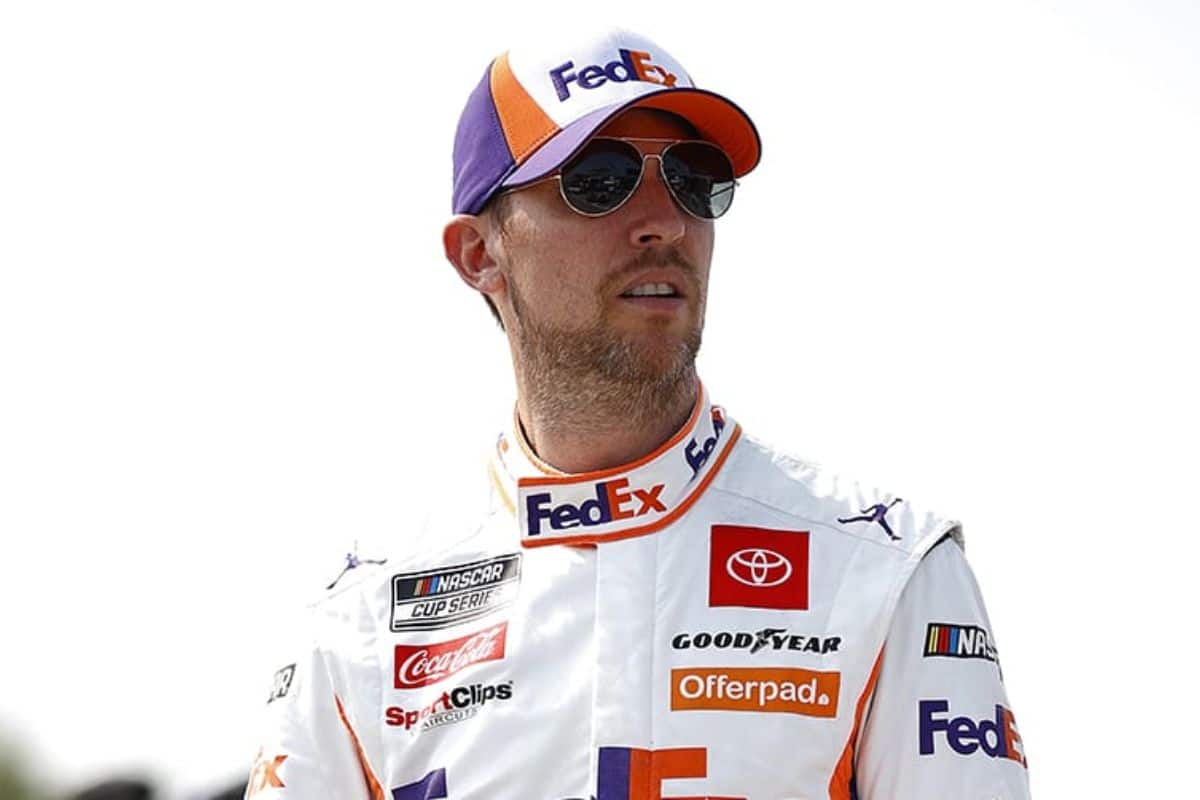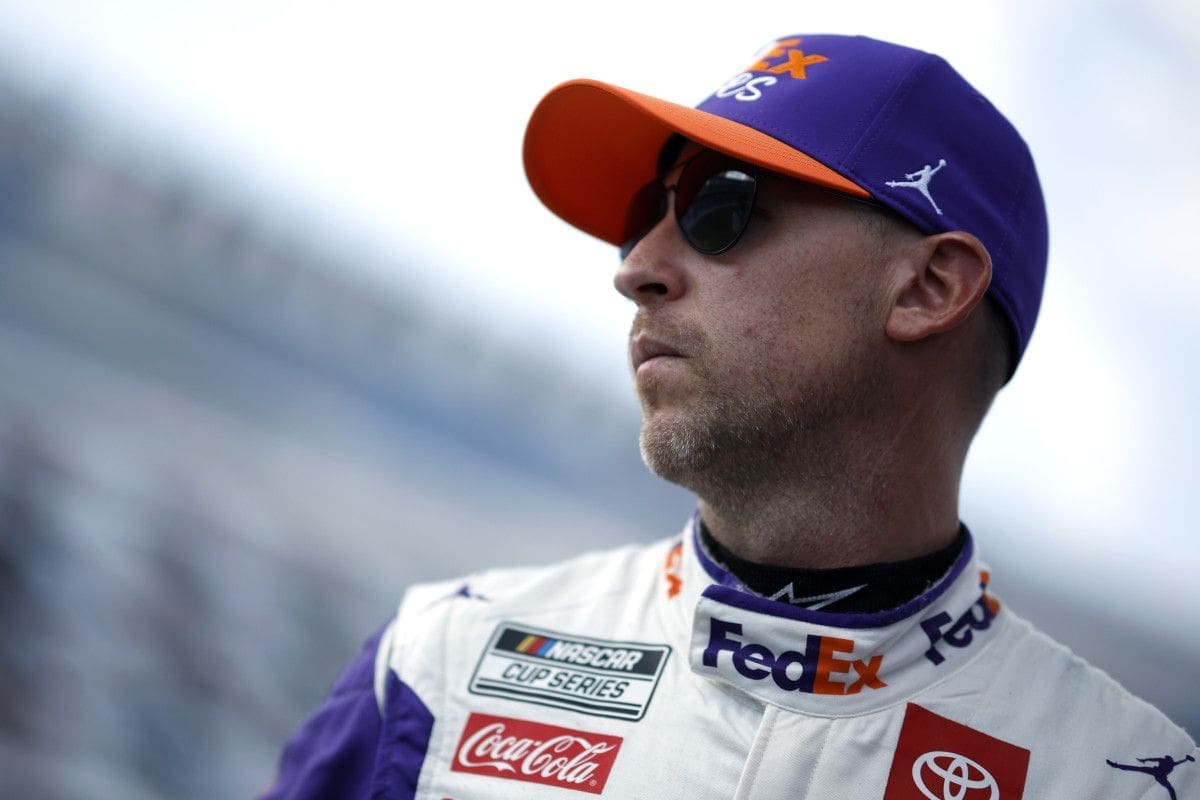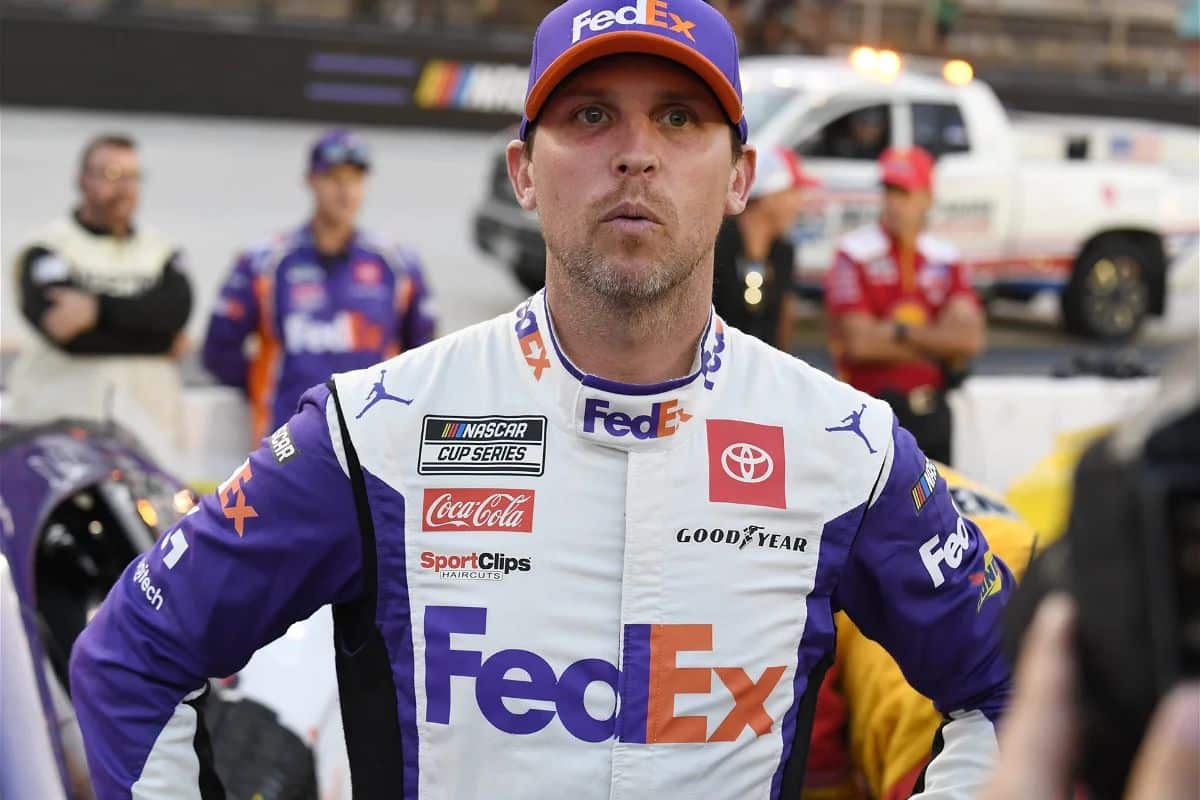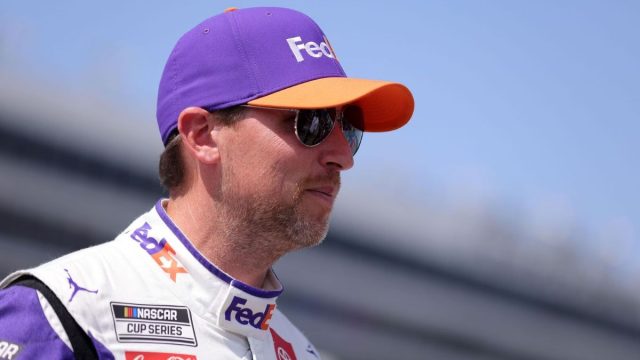Denny Hamlin Claims NASCAR: Denny Hamlin‘s claim that NASCAR’s financial structure would have driven Tony Stewart into bankruptcy if he hadn’t sold his team has sparked significant debate within the racing community. Hamlin’s criticism targets the revenue distribution model, highlighting how it disproportionately strains teams like Stewart-Haas Racing. This insight brings into question the sustainability of NASCAR’s economic practices and their impact on the sport’s competitive landscape. With sponsorship challenges and concerns about the Next-Gen car adding to this complex issue, it becomes imperative to examine whether NASCAR’s current financial approach is tenable in the long run.
Key Highlights
- Denny Hamlin criticized NASCAR’s financial practices, implying they would have bankrupted teams like Tony Stewart’s.
- Hamlin highlighted the inequitable revenue distribution model as a significant financial strain on race teams.
- High operational costs and ongoing expenditures of charters were identified as major financial burdens.
- The difficulty in securing and maintaining sponsorships exacerbates the financial instability of teams.
- The Next-Gen car’s increased expenses and compliance costs have further strained team finances.
Economic Challenges in NASCAR
The economic challenges in NASCAR are indicative of the financial instability that can plague privately owned sports leagues, where the lack of flexibility in charters and reliance on sponsorships can jeopardize the viability of race teams. This precarious financial ecosystem is most evident in the struggles faced by teams that fail to perform consistently. The stringent charter system limits the operational adaptability of teams, causing a direct impact on their financial health.
In NASCAR, charters represent guaranteed entry into races, but they come with substantial financial commitments. Teams that do not perform well face the risk of losing sponsorship deals. These sponsorships are not merely crucial; they are vital for a team’s survival, often making up the bulk of their revenue. A team that underperforms loses its appeal to sponsors, leading to a vicious cycle of financial decline.
Tony Stewart’s recent announcement of his team shuttering operations is a reminder of these economic challenges. Stewart, a prominent figure in NASCAR, faced insurmountable financial challenges despite his storied career and significant contributions to the sport. The loss of million-dollar sponsorships proved to be a fatal blow to his team’s sustainability. This scenario highlights the broader issue within NASCAR where financial stability is heavily contingent upon continual performance and sponsor loyalty.
The intersection of rigid charters and the heavy reliance on sponsorships creates a fragile economic structure for NASCAR teams. Without the flexibility to adapt and the security of consistent funding, even the most celebrated teams are not immune to financial collapse, highlighting the inherent economic vulnerabilities in the sport.

NASCAR’s Unfair Economic Model
NASCAR’s economic model, characterized by its charter system and heavy reliance on sponsorships, inherently disadvantages race teams, often rendering long-term financial stability elusive.
This system requires teams to purchase charters, which are fundamentally licenses to participate in races. While charters offer some security by guaranteeing entry into races, they also impose significant financial burdens on teams due to their high cost and ongoing operational expenditures.
The reliance on sponsorships further highlights the issue. In an environment where corporate sponsorships are increasingly difficult to secure and maintain, teams face a challenging struggle to cover their substantial operational costs. Sponsorship revenue can be volatile, subject to economic downturns and shifts in corporate marketing strategies, leaving teams vulnerable to financial instability.
Moreover, the revenue distribution model in NASCAR is skewed, with a significant portion of the earnings funneled towards NASCAR itself and the track owners, while teams receive a relatively smaller share. This imbalance makes it difficult for teams to reinvest in technology, talent, and infrastructure, which are vital for competitive performance and long-term sustainability.
Denny Hamlin’s perspective emphasizes these systemic issues, suggesting that even successful teams like Tony Stewart’s Stewart-Haas Racing are not immune to the economic challenges imposed by NASCAR’s model.
Denny Hamlin Calls Out NASCAR’s Greed
Denny Hamlin recently voiced his criticism of NASCAR’s financial practices, highlighting how the organization’s prioritization of profit margins over fair revenue distribution hampers the sustainability of race teams. His comments come on the heels of NASCAR’s lucrative seven-year, $7.7 billion media rights deal signed last November, which brought in heavyweights like Amazon, Warner Brothers, and TNT Sports for the 2025 season. Despite this influx of capital, the distribution of financial benefits remains inequitable, with race teams not receiving a proportionate share of the increased revenue.
Hamlin’s pointed remarks emphasize a significant disconnect between NASCAR’s stated intentions and actual outcomes. Although NASCAR President Steve Phelps has publicly acknowledged the need to ‘alter the paradigm for our race teams’ and ensure their profitability, concrete measures to achieve this goal have yet to materialize. This delay in implementing a more equitable financial model has had dire consequences, notably leading to the impending dissolution of Stewart-Haas Racing by the end of 2024.
“They had their Ford deal that ran up at the end of this year, that was gonna be a big financial hit. Sponsorship wasn’t flowing out of its ears at the organization…Gene and Tony just keep putting more money into this, keep sinking more money to put on NASCAR’s show. I think they said, ‘Scr*w this. We’re out. We’re not gonna sit here and go under financial water to just keep your show going.’” – Hamlin
Stewart-Haas Racing, a team with a storied history that includes 69 victories and two championships, has been forced to cease operations due to unsustainable financial pressures. According to Hamlin, the expiration of their Ford sponsorship and the lack of sufficient alternative funding sources made continued participation untenable. Team owners Gene Haas and Tony Stewart decided to withdraw rather than absorb further financial burdens to support NASCAR’s operations.

Sponsorship Woes and Economic Model
As the financial burdens on race teams intensify, the reliance on sponsorships has become a critical yet unstable pillar in NASCAR’s economic model. Denny Hamlin’s recent comments highlight a systemic issue that has plagued the sport for years. NASCAR’s current revenue allocation disproportionately favors the organization over the teams, placing immense stress on them to secure substantial sponsorship deals merely to break even.
The case of Stewart-Haas Racing exemplifies these challenges. Once buoyed by significant sponsorships from companies like Smithfield Foods and Anheuser-Busch, the team has recently faced severe financial setbacks. Smithfield Foods’ exit from NASCAR and Anheuser-Busch’s shift to Trackhouse Racing have left a significant void in the team’s budget, illustrating the precarious nature of relying heavily on sponsorships.
A joint statement from Tony Stewart and Gene Haas, the co-owners of Stewart-Haas Racing, regarding the future of our team following the 2024 season. pic.twitter.com/S9hkjnTNXi
— Stewart-Haas Racing (@StewartHaasRcng) May 28, 2024
Hamlin eloquently points out that if the media revenue generated by NASCAR were equitably distributed to cover the operational costs of running a race car, teams like Stewart-Haas would not be facing such existential threats. ‘Had NASCAR’s media dollars covered what it costs to run a car, they would not be shutting down,’ he stated, highlighting a flawed economic model that forces teams into a relentless pursuit for sponsorship dollars.
. “I think it happened over time. You can debate how it happened over time…Listen, had NASCAR’s media dollars covered what it costs to run a car, they would not be shutting down. But unfortunately, we’re still under a sponsorship model that forces us to go get millions and millions of dollars in sponsorship just to break even.” – Hamlin
This reliance on external funding creates a volatile environment where teams’ financial stability is heavily influenced by the whims of corporate sponsors. Such an unsustainable model exposes the underlying vulnerabilities within NASCAR’s economic structure and calls for a re-evaluation of how revenue is shared. The current system, as Hamlin suggests, is not merely a temporary setback but a deep-rooted issue demanding systemic change to safeguard the long-term viability of race teams.
Next-Gen Car Concerns
The introduction of the Next-Gen car, aimed at reducing costs through the use of spec parts from approved vendors, has paradoxically resulted in higher expenses and financial strain for race teams. Intended to standardize components and streamline operations, the Next-Gen car has instead exacerbated economic challenges, prominently impacting teams like Stewart-Haas Racing (SHR). Despite its design, the car’s implementation has proven costly, as evidenced by the experiences of Tony Stewart’s team.
The Next-Gen car has undergone significant changes primarily due to safety concerns, following multiple driver injuries in 2022. These modifications, while necessary, have further inflated costs. Moreover, the stringent regulations surrounding the car’s parts have led to severe penalties for non-compliance. For instance, SHR driver Chase Briscoe faced a 120-point penalty and a $250,000 fine for using a counterfeit part in 2023, displaying the financial burden of adhering to these standards.
“For partners coming into the sport now, it’s a financial risk. It’s not got cheaper to operate a NASCAR team like this new car was designed. It’s costing us more money than it’s ever cost us to run these cars.” – Tony Stewart

News in Brief: Denny Hamlin Claims NASCAR
The critique by Denny Hamlin regarding NASCAR’s economic model highlights significant financial challenges faced by race teams, exemplified by Tony Stewart’s situation. The current revenue distribution system appears inequitable, exacerbating the financial strain on teams like Stewart-Haas Racing.
This points to the necessity for NASCAR to reassess its economic practices to foster a more sustainable environment. Addressing these concerns is essential for ensuring the long-term viability and competitiveness of teams within the sport.
Also read: Dale Jr. Credits Denny Hamlin With Surprising Praise
